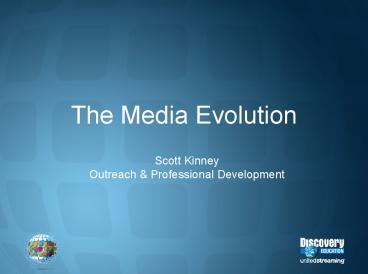The Media Evolution - PowerPoint PPT Presentation
1 / 40
Title:
The Media Evolution
Description:
Information obtained from the Pew Internet & American Life Project, eSchool News ... blogging, or visiting online communities such as Facebook, MySpace, and Webkinz) ... – PowerPoint PPT presentation
Number of Views:4731
Avg rating:3.0/5.0
Title: The Media Evolution
1
The Media Evolution
Scott KinneyOutreach Professional Development
2
Directions
- watch closely
3
what did we learn?
4
- now for the quiz
Information obtained from the Pew Internet
American Life Project, eSchool News Online, MSNBC
WikiPedia.
5
- How can we support these trends?
6
Students and Media
- Young people (8-18) today, spend an average of 6
½ hours a day with media - 4 hours a day watching TV
- 2 ¼ hours with parents
- 1 ¾ listening to music
- 1 ½ doing physical activity
- Over an hour on the computer
- Under an hour doing homework
- They are exposed to the equivalent of 8 ½ hours
of media a day
Source A Kaiser Family Foundation Study. March
2005
7
Top Five Gifts for Teenagers
- Portable Game Device
- Cell Phone
- Computer
- Video Game Console
- MP3 Player
Source Starkman, Neal (2007).Leave Me Alone....
T.H.E. Journal. 33-38.
8
As They Get Older
- Whats in on Campus
- Spring 2005
- Drinking beer
- Drinking other alcohol
- Spring 2006
- Drinking beer iPods
- Drinking beer tied with Facebook.com
- Drinking other alcohol
- Text messaging
Source USA Today. June 8, 2006
9
Meet Melanie
Name Melanie In Her Free Time loves to
travel My Notes Melanie is bright and energetic.
However, she is new to our country and struggles
at times with English.
10
Meet Melanie
Photograph Shark. Discovery Communications,
Inc.. 2005. unitedstreaming. 25 February 2006
11
Meet Melanie
Video La guía máxima Tiburones. Discovery
Channel School. 2001. unitedstreaming. 25
February 2006
12
What do we know about integrating media?
- but not just what we think
13
Scientifically Proven
- Virginia Evaluation 2002This independent
evaluation examined third and eighth grades
students in two areas of study -- science and
social studies. Improvement among experimental
group students who received instruction aided by
unitedstreaming showed a 12.6 average increase
in achievement over control group students. - Los Angeles Evaluation 2004This evaluation,
conducted in the Los Angeles Unified School
District, examined mathematics performance among
6th and 8th grade students. Students who received
instruction aided by unitedstreaming showed a 3
to 5 average increase in achievement in math
scores over the control group.
14
- Now, we are evolving from simply watching media
15
Meet My Little Girl
Name Kayla Age 3 1/2 About Kayla Kayla is three
and is no longer satisfied with simply watching
Elmo and Dora. Instead, she wants to interact
with them, answer questions and guide them in
their journey.
16
- the next step
create!
17
Telling Their Story
Name Uriel Favorite Subject Science My
Notes Uriel is creative and extremely
intelligent. However, Uriel just doesnt care to
write all of the time. He wants to express
himself in a variety of ways.
18
- What is the value of students telling their story?
Source Pink, D (2006). A whole new mind Why
right-brainers will rule the future. New York,
NY Penguin Group.
19
and this is much easier than it used to be.
20
- another student example
21
another tool
22
- and another student example
23
- at the high school level.
24
- What are the skills these students must have to
produce these products?
25
How People Learn
- A research-based synthesis consisting of 30 years
of educational research indicates - participation in social practice is a fundamental
form of learning - learning is increased by a diversity of cultural
experience and community participation
Brown, Ann L, Cocking, Rodney R Bransford ,
John D. How People Learn Brain, Mind,
Experience, and School. Washington National
Academies Press, 2000.
26
Social Practice In Action
a2b2c2
Pythagorean theorem
Vincent van Gogh
H2O2
Gordon Meade
Hydrogen Peroxide
27
Source http//www.sfett.com/html_movie/Ican/4.htm
l
28
Howard Martin Austin ISD, TX
29
Room 208
- While many schools restrict access to blogs,
WIKIs etc
others embrace it.
30
- and this is not an isolated example.
31
Social Networking Tools
- 96 percent of U.S. students ages 9 to 17 who
have internet access use social-networking
technology to connect with their peers (chatting,
text-messaging, blogging, or visiting online
communities such as Facebook, MySpace, and
Webkinz) - One of the most common topics of
discussioneducation - Nearly 60 percent of students report discussing
education-related topics
Source National School Boards Association,
(2007).CREATING CONNECTING//Research and
Guidelines on Online Social and Educational
Networking. 12.
32
- and who is leading this new wave of
collaborative communication technologies?
of course, our students.
33
but who is right behind them?
not the hospitality industry or the automotive
industry not even the tobacco industry
its you!
34
- but this doesnt apply to the real world
or does it?
35
- A typical day
36
A Typical Day
37
So, how do I get connected?
38
(No Transcript)
39
Contact Information
- Scott Kinney
- VP, Outreach Professional Development
- Email scott_kinney_at_discovery.com
- Websites
- discoveryeducation.com
- community.discoveryeducation.com
- discoveryedspeakersbureau.com
40
The Media Evolution
Scott KinneyOutreach Professional Development

